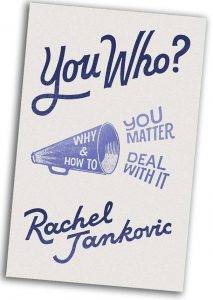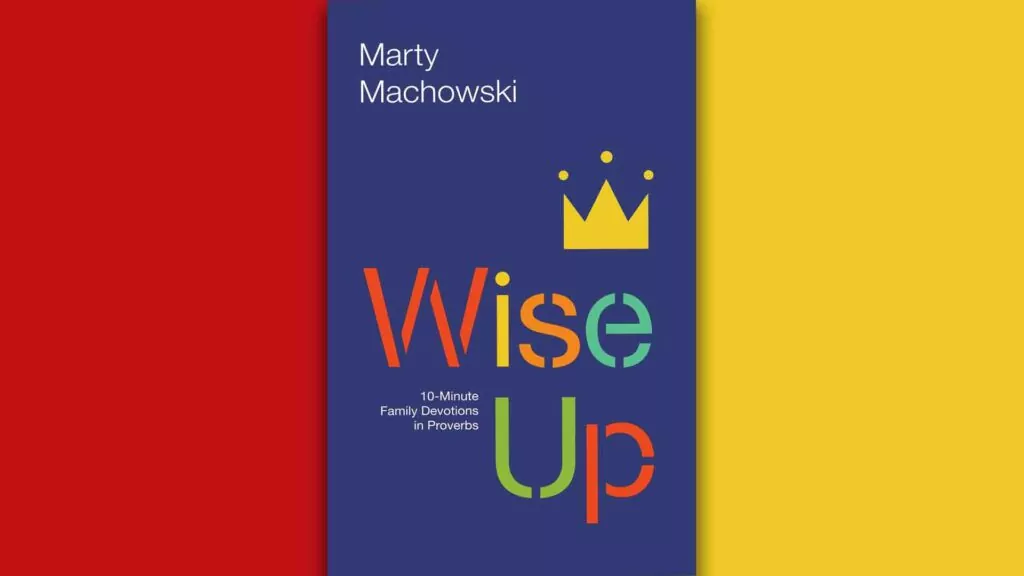An excerpt from Rachel Jankovic’s “You Who? Why You Matter and How to Deal with It”
****
Imagine you have always believed that it was up to you to craft yourself. You have bought into inspirational quotes such as this gem from Nathan W. Morris:
“Edit your life frequently and ruthlessly. It’s your masterpiece after all.”
You believe absolutely that you are creating a story in which you are the hero and that it is your responsibility to make this story what you want it to be. You must make yourself what you need to be because that is the only way to live fully! So you select things that you want to be in this masterpiece. You might add an interest in houseplants. You might edit out a toxic aunt. You might add spin class, or you might edit out additional responsibilities and clutter. You are crafting the story the way you want it to be.
Say that what you are trying to self-actualize is an interesting, vibrant, well-loved fun person. In addition, say that in this self-created world you are also (either coincidentally or centrally) a lesbian, or gay, or trans, or whatever other status you may have decided to incorporate. You see the story this way, and you think it is wonderful and intriguing and fun, and it is all according to your plan for who you think you are. You intentionally wrote these things into your story, or you discovered them to be part of your identity, so you have decided to feature them.
Given all this imaginary set up, do you see why it would feel like hate if Christians do not “affirm” your story? It would feel truly spiteful because it would seem like someone had come into your story to criticize it unfairly. If you penned in all these things with a note in the margin (“and everyone loved her and was jealous of her life”), then even a quiet disagreement with your choices from others would make you (the author) into a liar.
Imagine that you are confidently writing your story assuming the genre is romantic comedy. Imagine a Christian coming in to tell you (the tone of voice is really irrelevant here) that actually this is a tragedy and the main character is about to die.
 But how? How could someone else dare to make you a liar in your own story? How could the author become a liar about herself? You do get to write your own story, don’t you? Isn’t this what everyone has always told you? How dare anyone come along and flat-out deny your truth? How dare they say, “No, you aren’t a boy, and you never will be.” How dare they tell you that you may not do whatever you want to do or be whatever you want to be? How dare they come and tell you that you are not the author and that this story is wholly other than what you think you have been writing? As a trans person recently said to someone who refused to use their special pronouns, “Are you denying my existence?”
But how? How could someone else dare to make you a liar in your own story? How could the author become a liar about herself? You do get to write your own story, don’t you? Isn’t this what everyone has always told you? How dare anyone come along and flat-out deny your truth? How dare they say, “No, you aren’t a boy, and you never will be.” How dare they tell you that you may not do whatever you want to do or be whatever you want to be? How dare they come and tell you that you are not the author and that this story is wholly other than what you think you have been writing? As a trans person recently said to someone who refused to use their special pronouns, “Are you denying my existence?”
This is not a collision of preferences or manners. This is a collision of answers to the most basic questions of life… “Who are we? Who decides? What does it mean, and why does it matter anyway?”
If the Christian idea about identity is right, then all the self-constructed people in the world have been building their little selves out in the thin air off the cliff edge like so many Wile E. Coyotes. The bottom isn’t about to fall out from under them because it has never been there at all. There is no safety, there is no refuge, there is no security. It is understandable that all they can see in our Christian claims is hate.
But from our Christian perspective, speaking the truth is very far away from hate. The more any of us tries to cobble together the pieces of things around us – racial identity, sexual identity, hobby identity, political identity, pet owner identity – the smaller we become. In other words, the more we try to build up an identity apart from God and apart from His Word, the less truly us we become. It doesn’t matter how long or thoughtful or detailed the story you are writing is. If it is written by a character in the story rather than the Author of the story, it can only ever be tiny; it will always be minuscule by comparison. You cannot, as a character, out-write the Author of you.
This is excerpted here with permission from the publisher, Canon Press. You can find “You Who?” at online retailers everywhere and find our review here.












